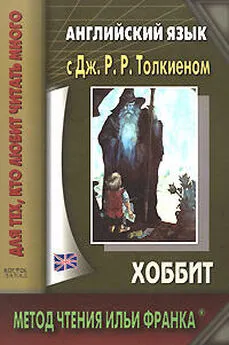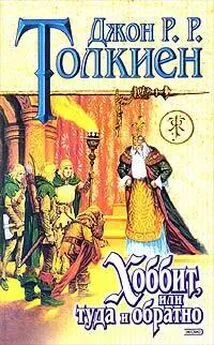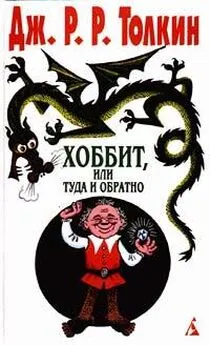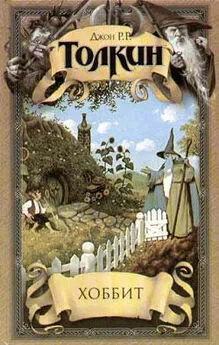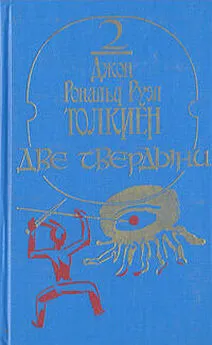Джон Толкиен - Английский язык с Дж. Р. Р. Толкиеном. Хоббит
- Название:Английский язык с Дж. Р. Р. Толкиеном. Хоббит
- Автор:
- Жанр:
- Издательство:АСТ, Восток-Запад
- Год:2008
- Город:Москва
- ISBN:978-5-17-048593-2, 978-5-478-00597-9
- Рейтинг:
- Избранное:Добавить в избранное
-
Отзывы:
-
Ваша оценка:
Джон Толкиен - Английский язык с Дж. Р. Р. Толкиеном. Хоббит краткое содержание
В книге предлагается произведение на английском языке Джона Р. Р. Толкиена «Хоббит», адаптированное (без упрощения текста оригинала) по методу Ильи Франка. Уникальность метода заключается в том, что запоминание слов и выражений происходит за счет их повторяемости, без заучивания и необходимости использовать словарь.
Пособие способствует эффективному освоению языка, может служить дополнением к учебной программе.
Предназначено для студентов, для изучающих английский язык самостоятельно, а также для всех интересующихся английской культурой.
Пособие подготовила Ольга Ламонова.
Английский язык с Дж. Р. Р. Толкиеном. Хоббит - читать онлайн бесплатно полную версию (весь текст целиком)
Интервал:
Закладка:
spearman [ˈspɪǝmǝn] prayer [preǝ] treacherous [ˈtretʃ (ǝ) rǝs] march [mɑ: tʃ]
“That will be the last we shall hear of Thorin Oakenshield, I fear, ” said the king. “He would have done better to have remained my guest. It is an ill wind, all the same, ” he added, “that blows no one any good. ” For he too had not forgotten the legend of the wealth of Thror. So it was that Bard’s messengers found him now marching with many spearmen and bowmen; and crows were gathered thick, above him, for they thought that war was awakening again, such as had not been in those parts for a long age. But the king, when he received the prayers of Bard, had pity, for he was the lord of a good and kindly people; so turning his march, which had at first been direct towards the Mountain, he hastened now down the river to the Long Lake. He had not boats or rafts enough for his host, and they were forced to go the slower way by foot; but great store of goods he sent ahead by water. Still elves are light — footed, and though they were not in these days much used to the marches and the treacherous lands between the Forest and the Lake, their going was swift. Only five days after the death of the dragon they came upon the shores and looked on the ruins of the town. Their welcome was good, as may be expected, and the men and their Master were ready to make any bargain for the future in return for the Elvenking’s aid.
Their plans were soon made (их планы вскоре были составлены). With the women and the children (вместе с женщинами и детьми), the old and the unfit (со старыми и нездоровыми; (un) fit— (не) пригодный, (не) подходящий; (не) способный; (не) здоровый ), the Master remained behind (Глава Города оставался на месте: «сзади, позади»); and with him were some men of crafts (и с ним же оставались несколько ремесленников; craft — ремесло, профессия, умение ) and many skilled elves (и множество умелых эльфов); and they busied themselves felling trees (и они занимались тем, что валили деревья; to busy (oneself) — заниматься ), and collecting the timber (и собирали древесину; timber — лесоматериал, древесина ) sent down from the Forest (отправленную с Леса). Then they set about (затем они принимались; to set about (doing) smth. — приниматься за что-либо, приступать к чему-либо ) raising many huts by the shore (за строительство: «возведение» множества хижин на берегу; to raise — поднимать; возводить ) against the oncoming winter (так как приближалась зима: «против приближавшейся зимы»); and also under the Master’s direction (и, также под указаниями Главы Города) they began the planning of a new town (они начали планирование нового города), designed more fair and large (который проектировался еще красивее и больше) even than before (даже чем раньше), but not in the same place (но не на том же самом месте). They removed northward higher up the shore (они подвинули /город/ к северу, выше по берегу); for ever after they had a dread of the water (так как с тех пор у них был благоговейный ужас перед водой) where the dragon lay (где лежал дракон). He would never again return to his golden bed (никогда больше он не вернется на свое золотистое ложе), but was stretched cold as stone (а растянулся, холодный, как камень), twisted upon the floor of the shallows (извиваясь: «выкрученный» по дну мелководья; twisted — искривленный, извилистый ). There for ages his huge bones could be seen (там, многие годы, его огромные кости можно было увидеть: «могли быть видны») in calm weather (в спокойную погоду) amid the ruined piles of the old town (среди разрушенных свай старого города). But few dared to cross the cursed spot (но немногие осмеливались пересечь то проклятое место), and none dared to dive into the shivering water (и никто не осмеливался нырнуть в трепещущие воды) or recover the precious stones (или добыть /обратно/ драгоценные камни) that fell from his rotting carcass (что упали с его гниющей туши; carcass — туша животного; /уст. / труп; остов, основа, костяк; каркас ). But all the men of arms (но все вооруженные люди; arms — оружие ) who were still able (что все еще были способны), and the most of the Elvenking’s array (и большинство войска Короля эльфов; array — строй, боевой порядок, войско, вооруженные отряды ), got ready to march north to the Mountain (приготовились выступить маршем на север, к Горе). It was thus (таким вот образом случилось так) that in eleven days from the ruin of the town (что через одиннадцать дней от крушения города) the head of their host (головная часть их войска) passed the rock-gates at the end of the lake (прошла скалистые ворота у конца озера) and came into the desolate lands (и вступила на заброшенные земли).
felling [ˈfelɪŋ] timber [ˈtɪmbǝ] carcass [ˈkɑ: kǝs]
Their plans were soon made. With the women and the children, the old and the unfit, the Master remained behind; and with him were some men of crafts and many skilled elves; and they busied themselves felling trees, and collecting the timber sent down from the Forest. Then they set about raising many huts by the shore against the oncoming winter; and also under the Master’s direction they began the planning of a new town, designed more fair and large even than before, but not in the same place. They removed northward higher up the shore; for ever after they had a dread of the water where the dragon lay. He would never again return to his golden bed, but was stretched cold as stone, twisted upon the floor of the shallows. There for ages his huge bones could be seen in calm weather amid the ruined piles of the old town. But few dared to cross the cursed spot, and none dared to dive into the shivering water or recover the precious stones that fell from his rotting carcass. But all the men of arms who were still able, and the most of the Elvenking’s array, got ready to march north to the Mountain. It was thus that in eleven days from the ruin of the town the head of their host passed the rock-gates at the end of the lake and came into the desolate lands.
Chapter 15. The Gathering of the Clouds
(Глава 15. Облака собираются)
gathering — собирание; встреча; скопление; to gather — собирать (ся)
Now we will return to Bilbo and the dwarves (теперь мы вернемся к Бильбо и гномам). All night one of them had watched (всю ночь один из них вел наблюдение), but when morning came (но когда пришло утро) they had not heard or seen any sign of danger (они не услышали и не увидели ни одного признака опасности). But ever more thickly the birds were gathering (но птицы собирались все больше и больше; thickly — густо, обильно, в большом количестве, плотно ). Their companies came flying from the South (стайки птиц: «их компании» прилетали с Юга); and the crows that still lived about the Mountain (и вороны, что все еще жили вокруг Горы) were wheeling and crying unceasingly above (описывали круги и беспрестанно кричали /у них/ над головами; to wheel — катить (ся), описывать круги, вращаться, кружить; to cease — прекращать (ся), останавливать (ся) ).
“Something strange is happening (происходит что-то странное), ” said Thorin. “The time has gone for the autumn wanderings (время /для/ осенних перелетов прошло; wandering — блуждание, странствие; to wander — бродить, странствовать ); and these are birds that dwell always in the land (а это птицы, которые вообще всегда обитают в этих землях); there are starlings (это скворцы) and flocks of finches (и стайки зябликов); and far off there are many carrion birds (а там, вдалеке, множество птиц что /питаются/ падалью; carrion — падаль, мертвечина ) as if a battle were afoot (словно /если/ где-то готовится битва; afoot — в движении, в процессе подготовки )!”
Suddenly Bilbo pointed (внезапно Бильбо указал /пальцем/): “There is that old thrush again (вот снова тот старый дрозд)!” he cried (закричал он). “He seems to have escaped (он, кажется, спасся), when Smaug smashed the mountain-side (когда Смауг разломал склон горы), but I don’t suppose the snails have (но я что-то не думаю, что улитки спаслись)!”
unceasingly [ʌnˈsi: sɪŋlɪ] finch [fɪntʃ] carrion [ˈkærɪǝn]
Now we will return to Bilbo and the dwarves. All night one of them had watched, but when morning came they had not heard or seen any sign of danger. But ever more thickly the birds were gathering. Their companies came flying from the South; and the crows that still lived about the Mountain were wheeling and crying unceasingly above.
“Something strange is happening, ” said Thorin. “The time has gone for the autumn wanderings; and these are birds that dwell always in the land; there are starlings and flocks of finches; and far off there are many carrion birds as if a battle were afoot!”
Suddenly Bilbo pointed: “There is that old thrush again!” he cried. “He seems to have escaped, when Smaug smashed the mountain-side, but I don’t suppose the snails have!”
Sure enough the old thrush was there (и точно, там сидел старый дрозд; sure enough — действительно, конечно, на самом деле ), and as Bilbo pointed (и, как Бильбо и указал), he flew towards them (он подлетел к ним) and perched on a stone near by (и взгромоздился на камень рядом с ними). Then he fluttered his wings (затем он затрепыхал крыльями) and sang (и запел); then he cocked his head on one side (затем он склонил голову на один бок), as if to listen (словно прислушивался: «словно чтобы прислушаться»); and again he sang (и снова запел), and again he listened (и снова слушал).
Читать дальшеИнтервал:
Закладка:
